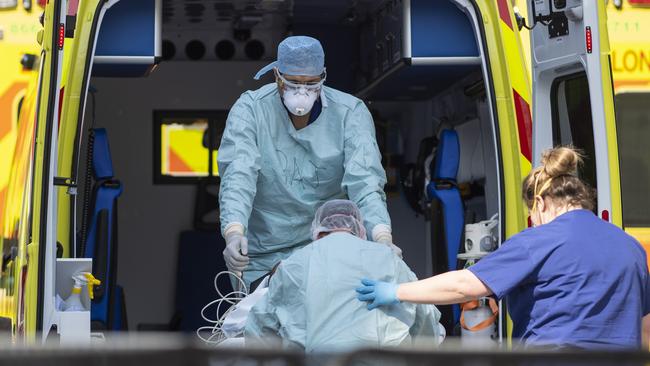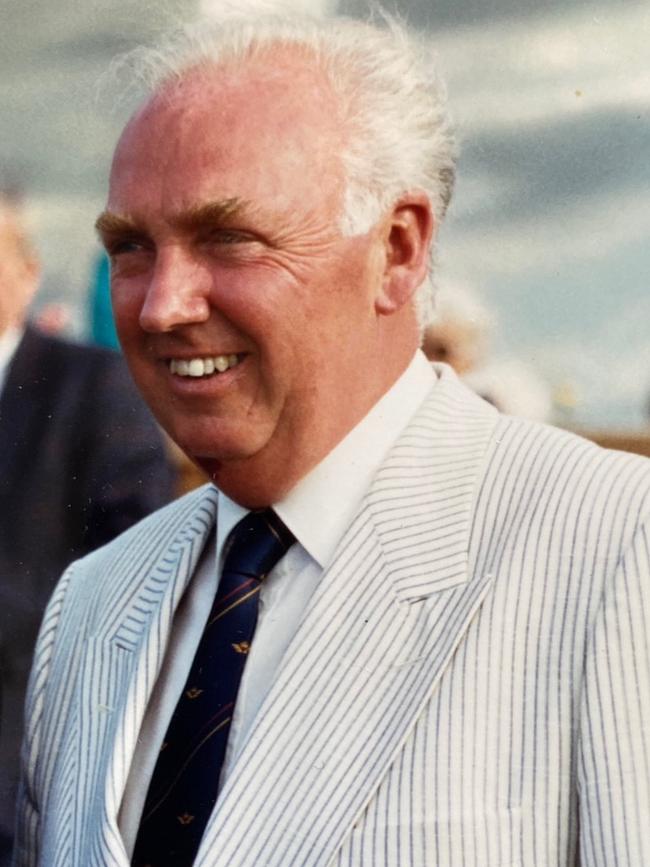Dad and how many others sentenced to lonely deaths
When a premier is able to persuade the federal government to mobilise the army to cover his incompetence, we are approaching dangerous territory.

My grandmother was embarrassed by her hands. They were gnarled and scarred, in winter red and cracked and prone to chilblains.
Her family had crossed the Irish Sea to exchange the abject rural poverty of County Cork for the everyday industrial poverty of Liverpool, where Kate Boyle married Freddie Waterson, a Lancastrian who promptly went off to war in Flanders and left an eye and much of his spirit in the mud of Passchendaele.
While he worked as a hospital porter, she found a job in the fish market and worked in the open air for years, chopping and filleting the cod and haddock she pulled from buckets of ice. Hence the ruined hands.
My father, Hugh, was the sixth of their seven children. He delighted in telling his own kids of growing up in what he called the arse-end of Liverpool during World War II, how aged seven he learned to queue to buy fish at his mother’s stall and pretend not to know her as she slipped an extra piece into his basket. We rolled our eyes and pretended to stifle yawns, but it must have been a seriously hard upbringing, though no worse than many in those days.
Childhood shaped him, as it does us all: he was determined, uncompromising to the point of intransigence, his toughness leavened by a wicked sense of humour, and driven by the ambition to ensure his family had a more comfortable life than he did. University was far beyond his reach, but after National Service he studied at night to qualify as a pharmacist, eventually owning his own chemist shop in Anfield, not far from his beloved Everton FC’s stadium, but a little closer than he would have liked to Liverpool’s.
It’s nothing unusual to love your family, but it seems that those who survived the war years had a more profound sense of its importance and fragility. My father was an intelligent, often nuanced, man, but he had a simple faith that a close family was the fundamental atomic particle of society, offering strength and consolation in an unforgiving world.
Ironic then that after a fall six weeks ago he was loaded into an ambulance and whisked away, not to be seen again until my sister was summoned by special dispensation to witness his last two hours of life.

The urge to be with people is so powerful that it’s essential to existence. I have no doubt my dad would still be alive had he been permitted to see his family and friends. Whether he would have wanted to linger on as an invalid is another matter, but that shouldn’t have been determined by his floundering government and its cruel, idiotic, inflexible rules.
This hugely gregarious man spent his last three months isolated, by law, in his own home, then in hospital, then a care home, without a single visit from anyone. He was tested four times for the virus; all negative.
Was it really beyond the wit of all those hospital bureaucrats to devise an infection-free system that would have permitted him and his fellow patients some human contact? Apparently so. And while my dad died under Britain’s lockdown, conditions for our old people in Australia haven’t been much gentler.
Here is the double-edged sword of belonging to a social species: it makes us vulnerable to catching diseases from each other, yes, but lose that contact and we lose most of our joy, from the intimacy of couples to the laughter of friends, the conviviality of diners in a restaurant or drinkers in a cosy pub, the tingling, tribal sense of belonging in a football crowd or a street protest; and, ultimately, a comforting hand at your bedside.
Hugh’s story joins millions of lives damaged and destroyed, not by the virus but by the fevered reaction to it. For him the proximate cause was medical, and he might not have made Christmas anyway; but for so many more the misery of unemployment, the feelings of shame as their lovingly nurtured businesses collapse in debt and bankruptcy, the terrifying prospect of penurious old age, will poison their remaining years.
My father was prepared to risk his life to see his loved ones; others might have confronted that risk to save their human dignity. There’s no measurable coronavirus curve any more, so maybe we should try to flatten the poverty curve looming steeply ahead of us and eradicate the contagion of fear.
Instead, every day more illogical, arbitrary, contradictory regulations pop up, contort themselves, disappear and bubble up again like the wax in a 1960s lava lamp. There is, I think, only one way to make sense of them all: that is to understand that our politicians and the experts who counsel them have literally no idea how to escape the madness they have plunged us into.
The virus is out there now, all over the world, and it likely will arrive here in force one day. Are we to close our borders forever? Do we wait for a vaccine that may never arrive? Do we hide at home, trembling, until something else takes us? Our hospitals have been at action stations for months now, prepared for an outbreak of thousands of cases, but governments still refuse to relax their grip on our freedoms. They warn of a “second wave”, when the first one hasn’t yet arrived.
At the first tiny bump in infections they whip out the only weapon their limited imaginations have fashioned: lockdown, the order to bury ourselves ever deeper under the blankets. It’s moronic and bullying, but when it involves a premier persuading the federal government to mobilise the army to cover his incompetence, we are approaching dangerous territory. If it’s not quite dictatorship, it will do, as they say, until the real dictatorship arrives.
Every new case is reported by a breathless media and met with a fresh burst of hysteria; even many doctors, traditionally calm, reassuring figures, now embrace the worst-case scenario.
It will be interesting in a year or two to see the real figures on excess deaths during this period. Some countries are already cautiously reporting fewer than usual deaths this month from flu-type illnesses, but of course this may simply mean that the virus has stolen away the weak and sick who might have held on a little longer.
Will there be a boom in cancer-related mortality, as operable tumours turn into death sentences for lack of screening? Will some accounting be made of all the other non-virus conditions exacerbated by the postponement of “non-essential” treatment and surgeries?
What has been missing all along in this man-made crisis, and I fear it may take a while to rediscover, is a sense of proportion.
There’s a wise old principle in carpentry: measure twice, cut once. It should have made our politicians pause and weigh the consequences of all the possible responses to the threat before they were formulated, but it didn’t.
Instead they and their advisers panicked, looked around to see what the other headless chooks were doing, and took their axes to anything they could perceive as a risk, building fences around and across the country.
Since the ancient days of leper colonies we’ve isolated the sick to protect the healthy. This must be the first time in human history we’ve done things the other way around, and largely without the vulnerable having any say in it. My father was appalled, and I suspect many others would have shared his disappointment.
Although there was no way of seeing him in his last weeks, I did have one conversation with my dad a fortnight before he died. I’d been trying various numbers, but his mobile phone had disappeared somewhere in the confusion of his moves, and the hospital’s bedside telephone was an 0872 premium-charge number, inaccessible from overseas. My sister relayed messages, but Hugh grew more bewildered and agitated, lucid but struggling to comprehend why none of his family had been to see him.
Then the day after he was moved into the care home, triggering a further 14 days of total isolation, a kindly nurse, breaking the rules, carried the ward phone over to him and he chatted to me, then my daughter, before asking to speak to me again. “Please, son,” he said, the beginning of tears in his voice, “come and get me out of here.” Those were his last words to me; it’s not a memory to treasure, but happily I have others.
More than two months ago in these pages, when the panic was just beginning, I quoted my dad’s view that most people at his stage of life would prefer to take their chances with the virus if it meant they could see their families. At 87, he said, whatever happened to him as a result would not be “a f..king national tragedy”.
He was right; his death is but a personal tragedy for the tiny group of people who were able to attend, or livestream, his funeral two days ago. But add it to all the other deaths made unnecessarily miserable by this well-meaning brutality, factor in all the sadness to come, and national tragedy doesn’t begin to do it justice.






To join the conversation, please log in. Don't have an account? Register
Join the conversation, you are commenting as Logout